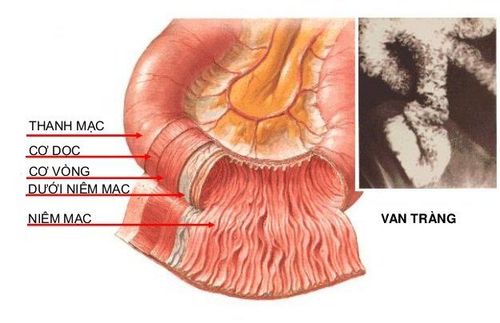This is an automatically translated article.
Article written by Doctor Mai Vien Phuong - Department of Medical Examination & Internal Medicine - Vinmec Central Park International General Hospital
Celiac disease is also known as gluten sensitivity or gluten intolerance. This is an allergy to a form of protein called gluten, which does not allow the body to absorb gluten.
1.The role of antibody testing
Due to the relatively diverse and atypical clinical features, the use of serum antibodies for pre-indication for colonoscopy and duodenal biopsy is widely used by clinicians.
The first antibody discovered and the first screening application in Celiac was the antigliadin antibody (AGA). However, the sensitivity and specificity of this antibody is not high, so it is no longer widely used in clinical practice.
In addition, there have been some reports that in healthy individuals or with certain gastrointestinal disorders other than Celiac can also increase levels of AGA. The introduction of tests for gluten-dependent IgA-class R1-type reticulin (ARA) and endomysial autoantibody (EMA) antibodies helps to overcome these disadvantages. this.
In most studies, sensitivity and specificity can be above 90%. In symptomatic patients, a positive EMA serologic test can diagnose Celiac.

In 1997, when transglutaminase 2 (TG2) was discovered as a specific antigen in Celiac, techniques using ELISA to identify anti-TG2 antibodies and deamidated gladin peptide antibodies - anti DGP) was born [18].
The use of immunoglobulin A anti-tissue transglutaminase (IgA TTG) antibodies has been validated in multiple cohort studies. The sensitivity and specificity of this antibody in untreated Celiac patients are both up to 95%. However, IgA deficiency is common in Celiac patients with the rate of 2 - 3%, higher than the rate in the general population (1/800 - 1/400).
In cases with high risk factors for Celiac disease and negative specific IgA TTG antibodies, quantitative testing of the patient's general IgA antibody is necessary to rule out negative for gas deficiency and endoscopy is indicated to biopsy. IgA deficiency is also seen in some diseases that cause atrophy of the villi in the duodenum, such as bacterial overgrowth in the small intestine, and immunoglobulin deficiency diseases. Therefore, in these cases, IgG antibody tests (IgG DGP and IgG TTG) can be used.
Applying a gluten-free diet will reduce the concentration of antibodies in Celiac with the rate of seronegative antibodies up to 80% after 6-12 months and after 5 years, the rate is 90%. Therefore, to diagnose Celiac, it is necessary to conduct antibody tests when the patient is still using a normal, gluten-free diet. In children younger than 2 years of age, the TTG and EMA antibody tests are both less sensitive and more sensitive for AGA and DGP antibodies. However, because the overall low sensitivity and specificity of AGA is no longer used as a screening test in Celiac, a combination of TTG and DGP antibody testing can be used in young children.
2. The role of genetic testing

The most important genetic factor in Celiac is the presence of the genes HLA-D02 and HLA-DQ8. A prospective study of 463 symptomatic patients undergoing small bowel biopsies when Celiac was suspected found that combining HLA-DQ gene testing with serum antibody tests did not increase the accuracy of the test. antibodies alone.
Therefore genetic tests are not routinely used for initial diagnosis. However, in cases where it is difficult to exclude Celiac, this test can be performed including:
Patients with persistent diarrhea but no cause can be found; - Histopathological lesions are uncharacteristic (Marsh I-II) and seronegative antibodies; Evaluation of patients on a gluten-free diet in the absence of previous diagnostic tests; There is a mismatch between serum antibody testing and histopathology; Patients suspected of having Celiac disease may have relapsed refractory to treatment while the original diagnosis is not clear, Patient Down: According to one study, the prevalence of Celiac in patients with Down syndrome in the United States was estimated to be 10% and HLA-DQ2 was present in 88% of Down cases with a positive EMA antibody test and in 16% of Down patients with a negative EMA antibody test. Negative testing for the HLA-DQ2 and HLA-DQ8 genes can rule out the risk of developing Celiac in children with Down syndrome.
3. Diagnosis in case the patient is on a gluten-free diet

When applying a gluten-free diet, specific serological tests and histopathological images do not return to normal within one month, so if the patient is new to this diet, there are still conventional diagnostic approaches can be used.
In patients with a longer gluten-free diet, normal serological and histopathological results cannot completely rule out Celiac.
In this case HLA-DQ2/DQ8 gene testing and “gluten testing” can be performed. This is considered the gold standard for definitive diagnosis in patients with HLA-DQ2/DQ8 gene but serological and histopathological tests are negative. However, in the case of a gluten-free diet, if the patient develops severe symptoms, it should be stopped.
4. What to prepare when going to the doctor if Celiac disease is suspected?
The doctor will need some of the following information to make a diagnosis, so you need to prepare answers to the following:When did the symptoms start? Do these symptoms appear continuously or occasionally, from time to time? How severe/mild are the symptoms? What can be done to reduce the above symptoms? Which food is more comfortable to reduce? When do symptoms worsen? What foods make symptoms worse? Does anyone in your family have celiac disease?

Do you have an autoimmune disease? Does anyone in the family have an autoimmune disease? Have you ever had abdominal surgery? Have you ever had a disease related to the pancreas, such as pancreatitis? Ever had an itchy skin rash with bubbles? Have you ever been anemic and need extra iron?
5. Treatment of Celiac Disease
By far, the gluten-free diet is the most effective treatment to prevent damage to the intestinal lining from progressing from gluten exposure. The main food sources of gluten are wheat, barley, and rye.
Although oats have been shown to be very low in gluten and can be used on a gluten-free diet to provide a patient source of fiber, B vitamins, magnesium and iron, the inclusion of oats in the diet Diet needs to be very careful. In these cases, it is advisable to consult a nutritionist and monitor for early detection if symptoms flare up. For newly diagnosed patients with Celiac, it is necessary to check the deficiency of micronutrients including iron, folic acid, vitamin D, vitamin B12 for appropriate nutritional advice.
Vinmec International General Hospital is a prestigious address trusted by many patients in performing diagnostic techniques and treating chronic inflammatory bowel diseases... Along with that, at Vinmec Hospital, the practice Currently diagnosed through gastrointestinal endoscopy with Olympus CV 190 endoscope, with NBI function (Narrow Banding Imaging - endoscope with narrow light frequency band) results in clearer mucosal pathological analysis images than with conventional endoscopy, detecting ulcerative lesions in the gastrointestinal tract.
Vinmec Hospital with modern facilities and equipment and a team of experienced experts who are always dedicated in medical examination and treatment, customers can rest assured with the gastrointestinal endoscopy service at the hospital. Vinmec International General Hospital.
Please dial HOTLINE for more information or register for an appointment HERE. Download MyVinmec app to make appointments faster and to manage your bookings easily.














